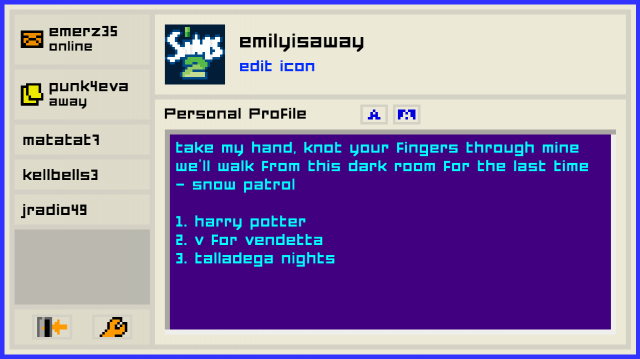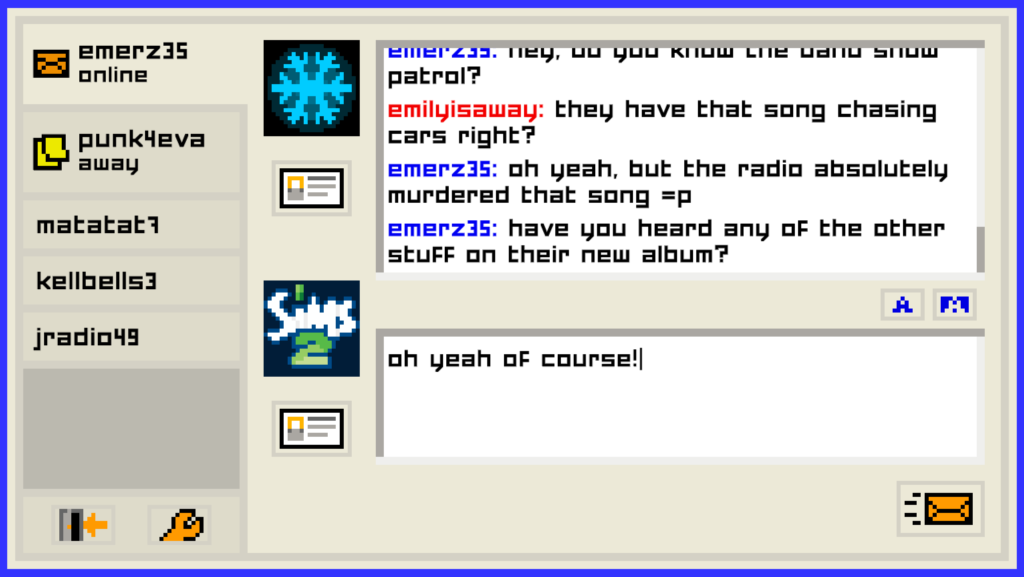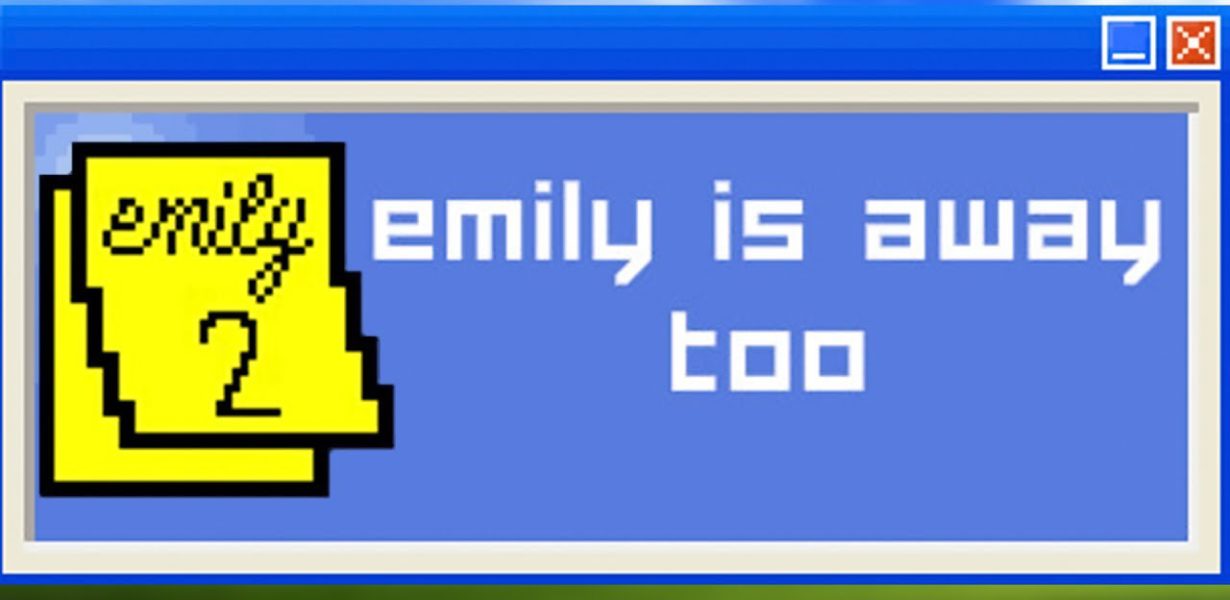Near the end of 2015, I spent the better part of one rainy December evening playing through the hit indie game Emily Is Away. Its style and attention to detail were impeccable. Instead of adopting a more traditional visual novel approach to its storytelling method, the game has you engage with your crush, the titular Emily, through a series of IM messages on an AOL client from the early 2000’s.
At the start of each story ‘chapter,’ which marks a change in season, you get to pick a new profile picture that suits the evolving tastes of your avatar. There are several options to choose from: icons for bands like Snow Patrol, movie logos for The Matrix, and basically any other early 2000’s mainstream pop culture reference you can think of. The entire game takes place in this AOL messaging client. You create your profile based on pre-selected options, you can view the profiles of people on your friends list, and you can see when they get online.
Emily Is Away Too expands on this concept even further. Now, instead of just talking to Emily, there’s a new girl named Evelyn who jumps into the online messaging fray. The game window is shaped exactly like a messaging client window; you can collapse it, go about your daily internet business on your computer, then Alt-Tab and jump straight back into the game.
While you only ever get to talk to Emily and Evelyn (two girls that you go to high school with, but share different social circles), the simple pleasure of mundane conversations really shines through here. High school is a whirlwind of awkwardness and self-discovery – you meet people that you want to get to know better, but can’t quite muster the courage to actually hold meaningful conversations with them in real life. So you fall back to reliable messaging clients instead, where you can present the most ideal version of the person you want to be, all from the safety of your own home. Your friends read your IM profiles, and that’s how they get a sense of who you are, what your identity is. Emily Is Away Too captures all of that with intensity and a sense of freaky realism.

As you chat with your virtual peers, you get to know more about them – what kinds of games they like to play, their favorite bands, how they spend their free time. While Emily is generally portrayed as the hipster girl who listens to alternative rock and keeps away from vices like alcohol and drugs, Evelyn is the punk rock chick who goes to Warped Tour with her friends after buying alcohol with a fake ID and smokes weed on the side. As the game continues, the player gets to decide the kind of person they want to be as well – whether you’re a carefree soul who wants to take life as it comes, or if you’re the kind of person who wants to get married, start a family, and settle down after college. Emily and Evelyn make careful notes of your answers, of course, as your high school love interests are often wont to do.
Then things get serious when you start talking about relationship stuff. One girl is in a relationship that starts to get toxic after her partner realizes that she doesn’t love him as much as he does, and the other is struggling to get over an ex who’s always a constant presence in her life. Your character can show romantic interest in either girl, and inevitably, you’ll reach a point in the conversation where the character (and subsequently, you) decides to pop the Ultimate Question: Do you think maybe we could ever be more than friends?
It’s the question that paralyzes every teenager who’s ever had romantic feelings for anyone, and even from the safety of our own homes, even as we’re comfortably seated behind a computer screen, the tension and anxiety that floods in right before hitting that ‘Send’ button is palpable. You can pick the Ultimate Question from a list of options that the game provides you, and you’ll then proceed to type on your keyboard, with each letter in the game’s pre-written message appearing as you clack away on your own keys. You feel your character’s hesitation as they delete the question, eventually deciding to replace it with something more innocuous. It’s a technique that was implemented near the end of the first game, and it’s used to great effect in Emily Is Away Too. It’s genius.

One particular chapter in Emily Is Away Too sees both girls returning home after a bad day. One is struggling to actually break up with her almost-abusive boyfriend, and the other just had a heavy conversation with the ex she can’t seem to move on from. Both are demanding for your attention, and it’s at this point where the game tasks you with managing the explosive emotions of these two girls at the same time. Take too long to respond to one girl, and she’ll think that you’re too busy to listen to her very real, very important problems. At one point, the game even starts to trip you up by including answer options for Evelyn that are actually meant for your responses towards Emily. Everything came to a screeching halt when I erroneously asked one girl if she was breaking up with her boyfriend, and she responded with, “What? I wasn’t going to break up with him. What the fuck? Are you even listening to me?”
They’re just AI, of course. Programs designed to give specific responses depending on the dialogue options you choose, but even that logic and knowledge didn’t stop me from freezing up as panic took over my mind while I tried to salvage the situation. But it was too late. She went offline. A sure sign that there’s absolutely no way for you to contact her again until the next time she signs back in. And so begins the excruciating wait.
The narrative in Emily Is Away Too didn’t quite grip me in the way that its predecessor had, but it improved upon a lot of its initial ideas by simply giving you a new chat room to work with. Links sent in-game take you to the game’s actual website where you can view YouToob videos and Facenook profiles. The characters make silly quips about how they’re going to start a poke war with each other on Facenook (I miss the days when that was a thing). The only way the game could’ve been better is if we had Lifejournals and MyFace pages as well.
Emily Is Away Too is so compelling because it acts as a portal to a long-forgotten, early 2000’s era. A teenage wasteland of pop culture profile icons, late night AOL chats, and the act of typing and rapidly deleting the most important message of all.


There are no comments.